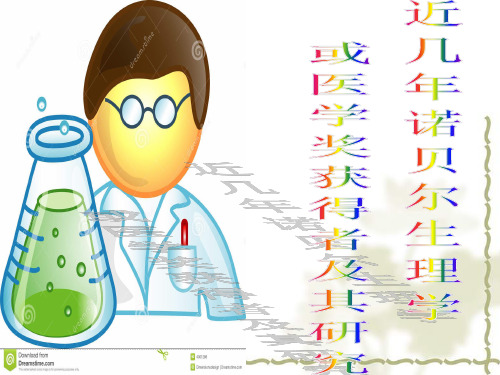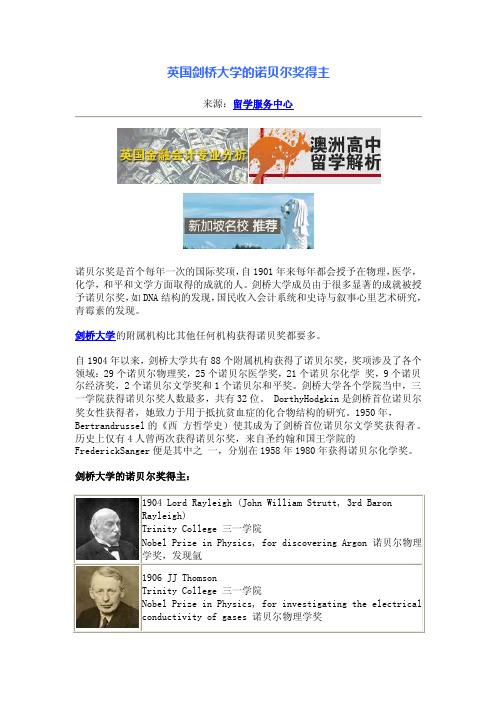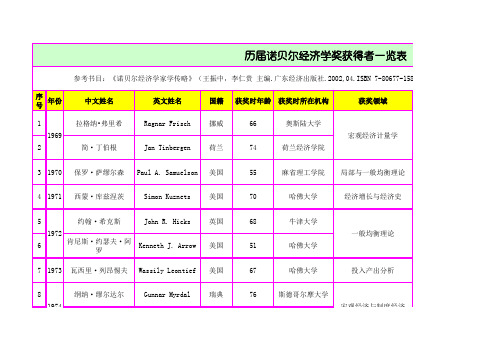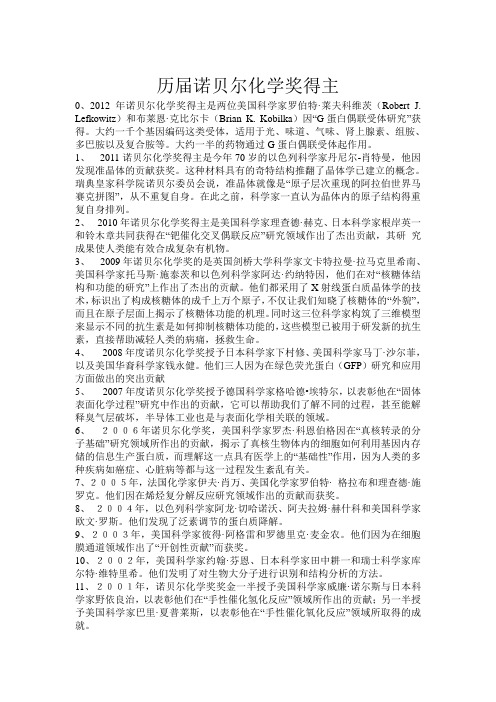2018年剑桥大学诺贝尔奖得主
曾获得诺贝尔奖的八位华人科学家

曾获得诺贝尔奖的八位华人科学家1957年因发现弱相互作用下宇称不守衡,从而导致有关基本粒子的重大发现获诺贝尔物理学奖。
李政道(T sung-Dao Lee,1926年11月24日-),美籍华人物理学家。
1957年,31岁的他与杨振宁一起,以弱作用下宇称不守恒的发现获得诺贝尔物理学奖。
他们的发现由吴健雄的实验证实。
李政道和杨振宁是首两位获诺贝尔奖的中国籍人士。
李政道出生于中国上海,祖籍江苏苏州,李政道曾在苏州东吴附中,江西联合中学等校就读。
因抗日战争,中学未毕业。
1943年在贵阳以同等学力考入迁至贵州的浙江大学物理系,走上物理学之路。
1944年日军进入贵州,浙江大学停学。
1945年转学到在昆明的西南联合大学为二年级生。
1946年赴美进入芝加哥大学,师从费米教授。
1950年获得博士学位之后,与合作者一起从事统计物理的相变以及凝聚态物理的极化子的研究。
1953年,他任哥伦比亚大学助理教授,主要研究工作是在粒子物理和场论领域。
三年后,在他29岁时,成为哥伦比亚大学二百多年的历史上最年轻的正教授。
1984年获得全校级教授这一最高级职称。
至今他仍活跃在物理研究的第一线,不断发表科学论文。
李政道于1962年加入美国国籍。
自从1970年代初,他和夫人秦惠莙开始回中国访问,他为中国的科学和教育事业做了很多贡献。
他向有关方面建议重视科技人才的培养、重视基础科学研究:促成中美高能物理的合作,建议和协助建立北京正负电子对撞机;建议成立自然科学基金;于1980年代设立CUSPEA考试,对优秀本科毕业生提供奖学金赴美攻读物理学博士;建议建立博士后制度;成立中国高等科学技术中心,北京大学和浙江大学的近代物理中心等学术机构。
1996年11月29日李政道的夫人秦惠莙因患肺癌离开人世。
为纪念夫人,1997年李政道及其亲友捐赠30万美元“秦惠莙与李政道中国大学生见习进修基金”,简称莙政基金。
莙政基金现支持北京大学、复旦大学、苏州大学、兰州大学与国立清华大学(台湾)等五所高校的优秀本科学生进行基础领域的科学研究工作,入选的学生则被命名为莙政学者。
近十五年诺贝尔经济学奖得主及其成就1997-2012

近十五年诺贝尔经济学奖得主及其成就获奖时间获奖者主要成就2011年美国纽约大学教授萨金特和普林斯顿大学教授西姆斯获奖理由:美国纽约大学教授教授托马斯-萨金特(Thomas Sargent)及普林斯顿大学教授克里斯托弗-西姆斯(Christopher Sims),由于对宏观经济影响研究获此殊荣。
颁奖词称,"今天,萨金特与西姆斯研究出的方法已成为宏观经济研究领域必不可少的工具。
2010年美国经济学家彼得-戴蒙德和戴尔-莫滕森,克里斯托弗-皮萨里季斯(具有英国和塞浦路斯双重国籍)获奖理由:皮特-戴蒙得以在最优税收领域的开创性研究而著名,最优税收理论被广泛应用于公共政策领域。
除劳动经济学外,他还研究宏观经济学和经济学理论。
莫滕森最知名之处是他在摩擦性失业理论方面的开创性研究工作。
皮萨里德斯主要学术贡献包括基于失业匹配函数的宏观经济搜寻及匹配理论,以及经济的结构性增长。
2009年美国加州大学伯克利分校经济学家奥利弗-威廉森-和印第安纳大学女教授埃莉诺-奥斯特罗姆获奖理由:其研究证明经济分析可以更清晰地显示社会组织的结构。
这两位学者的研究范畴,均属于新制度经济学领域,其中威廉森是"新制度经济学"的命名者;奥斯特罗姆则是首次获诺贝尔经济学奖的女学者,长期研究集体组织如何成功管理公共财产。
2008年普林斯顿大学教授保罗-克鲁格曼获奖理由:克鲁格曼整合了此前经济学界在国际贸易和地理经济学方面的研究,在自由贸易、全球化以及推动世界范围内城市化进程的动因方面形成了一套理论。
而他最引人关注之处在于他的汇率理论,以及依据这一理论对东亚金融危机与美国金融危机的预言。
2007年明尼苏达大学的赫维茨、芝加哥大学的马斯金,以及美国普林斯顿高等研究中心的罗杰-迈尔森获奖理由:"机制设计理论"最早由赫维奇提出,马斯金和迈尔森则进一步发展了这一理论。
这一理论有助于经济学家、各国政府和企业识别在哪些情况下市场机制有效,哪些情况下市场机制无效。
近几年诺贝尔生理学或医学奖获得者及其获奖理由

Байду номын сангаас 2007
美国科学家马里奥·卡佩奇和 奥利弗·史密西斯、英国科学 家马丁·埃文斯。这三位科学 家是因为“在涉及胚胎干细胞 和哺乳动物DNA重组方面的一系 列突破性发现”而获得这一殊 荣的。这些发现导致了一种通 常被人们称为“基因打靶”的 强大技术。这一国际小组通过 使用胚胎干细胞在老鼠身上实 现了基因变化。
2011 三位科学家分别是美国人布鲁斯·巴特 勒,卢森堡人朱尔斯·霍夫曼,以及加 拿大人拉尔夫·斯坦曼。获奖者发现了 免疫系统激活的关键原理,这使人们 对人体免疫系统的认识有了革命性的 改变。据介绍,无论是研发针对传染 病的“治疗性疫苗”,还是开发对抗癌 症的新方法,这三位科学家的研究成 果 有重要的意义。
们发现在细胞裂变中的重要控制物质,这可以使人们找到癌症治疗的 新方法。
2002 英国的约翰·劳尔斯顿和悉尼·布雷内、美国的罗伯特·霍维茨表
彰他们在研究基因如何控制器官发育和细胞死亡过程方面所作出的贡 献。
2003
美国科学家保罗·劳特 布尔和英国科学家彼 得·曼斯菲尔德表彰他们 在核磁共振成像技术领域 的突破性成就。这项技术 使人们可以详细了解大脑 和人体内部器官的状态。
2004
美国科学家理查德·阿 克塞尔和琳达·巴克表彰 两人在气味受体和嗅觉系 统组织方式研究中作出的 贡献。
2005 诺贝尔生理学或医学奖授 予澳大利亚科学家巴 里·马歇尔和罗宾·沃伦, 以表彰他们发现了导致胃 炎和胃溃疡的细菌——幽 门螺杆菌。
2006 美国科学家安德鲁·法尔 和克雷格·梅洛。他们发 现了核糖核酸(RNA)干扰 机制,这一机制已被广泛 用作研究基因功能的一种 手段并有望在未来帮助科 学家开发出治疗疾病的新 疗法。
牛顿成功的因素

牛顿成功的因素篇1牛顿是怎样成功的,首先在于他刻苦钻研,不屈不饶的精神。
牛顿小时候成绩不好,特别贪玩,但是脑袋灵活,经常做一些精巧的手工。
他看到大人们都去磨坊磨面,就钻研起风车转动的秘诀,虽然遭到小伙伴的嘲笑,但是牛顿越挫越勇,毫不气馁,终于找到了想要的答案。
二是牛顿找到了自己真正感兴趣的事业。
牛顿小时候家里条件很艰苦,父亲早早去世,母亲又改嫁他人,于是小小年纪的牛顿只好辍学回家务农,但是牛顿痴迷学习,总是干不好农活,后来母亲又让牛顿经商,以后可以养活自己,但是牛顿又对经商不感兴趣,因此经常受到大人的责骂。
好在牛顿的舅舅慧眼识珠,他看到牛顿是个读书的好苗子,于是就资助他继续读书,牛顿也不负众望,在校成绩一直很好,还考入及著名的剑桥大学,成为全家人的骄傲。
牛顿之所以能够成功还与他谦虚忘我,认真工作的精神分不开。
时间对每个人都是公平的,有的人虚度光阴,一事无成,而牛顿却总觉得时间不够用,总是加班加点不分昼夜的工作。
牛顿请客的故事家喻户晓,虽然闹了笑话,但是从中可以看出牛顿那种极端认真,忘我工作的精神。
这就是牛顿成功的奥秘。
篇2爱因斯坦说:“在人类的历史上,能够将物理实验、数学理论、机械发明结合为科学艺术的人只有一位,那就是牛顿。
”牛顿发现万有引力定律,发明微积分,首先提出可见光是由红、橙、黄、绿、蓝、靛、紫七个分光组成的。
他将数学导入科学,使物理、化学成为更精确的学问。
在牛顿的动力学三定律中,数学成为描述宇宙运动的语言。
种种杰出成就,为他赢得“历史上最杰出的科学家”与“近代物理学之父”的尊称。
他在1687年7月5日发表的《自然哲学的数学原理》里提出的万有引力定律以及他的牛顿运动定律,奠定了此后三个世纪里物理世界的科学观点,并成为了现代工程学的基础。
在力学上,牛顿阐明了动量和角动量守恒的原理。
在光学上,他发明了反射望远镜,还系统地表述了冷却定律,并研究了音速。
在数学上,他发明了微积分学,提出了“牛顿法”以趋近函数的零点,并为幂级数的研究作出了贡献。
英国剑桥大学的诺贝尔奖得主

英国剑桥大学的诺贝尔奖得主来源:留学服务中心诺贝尔奖是首个每年一次的国际奖项,自1901年来每年都会授予在物理,医学,化学,和平和文学方面取得的成就的人。
剑桥大学成员由于很多显著的成就被授予诺贝尔奖,如DNA 结构的发现,国民收入会计系统和史诗与叙事心里艺术研究,青霉素的发现。
剑桥大学的附属机构比其他任何机构获得诺贝奖都要多。
自1904年以来,剑桥大学共有88个附属机构获得了诺贝尔奖,奖项涉及了各个领域:29个诺贝尔物理奖,25个诺贝尔医学奖,21个诺贝尔化学 奖,9个诺贝尔经济奖,2个诺贝尔文学奖和1个诺贝尔和平奖。
剑桥大学各个学院当中,三一学院获得诺贝尔奖人数最多,共有32位。
DorthyHodgkin 是剑桥首位诺贝尔奖女性获得者,她致力于用于抵抗贫血症的化合物结构的研究。
1950年,Bertrandrussel 的《西 方哲学史)使其成为了剑桥首位诺贝尔文学奖获得者。
历史上仅有4人曾两次获得诺贝尔奖,来自圣约翰和国王学院的FrederickSanger 便是其中之 一,分别在1958年1980年获得诺贝尔化学奖。
剑桥大学的诺贝尔奖得主:1904 Lord Rayleigh (John William Strutt, 3rd BaronRayleigh)Trinity College Nobel Prize in Physics, for discovering Argon 学奖,发现氩 1906 JJ ThomsonTrinity College Nobel Prize in Physics, for investigating the electricalconductivity of gases1908 Ernest RutherfordTrinity CollegeNobel Prize in Chemistry, for atomic structure and radioactivity1915 Lawrence BraggTrinity CollegeNobel Prize in Physics, for analysing crystal structure using X-rays1917 Charles BarklaTrinity CollegeNobelof X-radiation1922 Niels BohrTrinity CollegeNobeland radiation1922 Francis AstonTrinity CollegeNobel Prize in Chemistry, for work on mass spectroscopy 诺贝尔化学奖1922 Archibald HillTrinity CollegeNobelmuscles1925 Austen ChamberlainTrinity CollegeNobel Prize in Peace, for work on the Locarno Pact尔和平奖1927 Charles WilsonSidney Sussex CollegeNobel Prize in Physics, for inventing the cloud chamber诺贝尔物理学奖1927 Arthur Holly ComptonNobel Prize in Physics, for discovering wavelength changein diffused X-rays1928 Owen RichardsonTrinity CollegeNobel Prize in Physics, for creating Richardson's Law贝尔物理学奖,创建理查森定律1929 Frederick HopkinsTrinity / Emmanuel CollegesNobelvitamins1932 Lord AdrianTrinity CollegeNobel诺贝尔医学奖1932 Charles SherringtonCaius CollegeNobel诺贝尔医学奖1933 Paul DiracSt John's CollegeNobel Prize in Physics, for quantum mechanics学奖1935 James ChadwickCaius CollegeNobel Prize in Physics, for discovering the neutron尔物理学奖,发现中子英国留学1936 Henry DaleTrinity CollegeNobel Prize in Medicine, for the chemical transmission of nerve impulses1937 George ThomsonTrinity CollegeNobel Prize in Physics, for interference in crystals irradiated by electrons1945 Howard FloreyCaius CollegeNobel Prize in Medicine, for the discovery of penicillin 诺贝尔医学奖,发现青霉素1947 Edward AppletonSt John's CollegeNobel诺贝尔物理学奖,发现阿普尔顿层1948 Patrick BlackettMagdalene / Kings CollegesNobel Prize in Physics, for nuclear physics and cosmic radiation1950 Bertrand RussellTrinity CollegeNobel Prize in Literature, for A History of Western Philosophy, 19461950 Cecil PowellSidney Sussex CollegeNobel Prize in Physics, for nuclear physics and cosmicradiation1951 John CockcroftSt John's / Churchill CollegesNobelstudy atomic nuclei1951 Ernest WaltonTrinity CollegeNobelstudy atomic nuclei1953 Hans KrebsNobel Prize in Medicine, for discovering the citric acidcycle1954 Max BornNobel Prize in Physics, for fundamental research intoquantum mechanics1957 Alexander ToddChrist's CollegeNobel Prize in Chemistry, for work on nucleotides化学奖英国留学1958 Frederick SangerSt John's College and fellow of King's College和大学国王学院Nobelmolecule1959 Philip Noel-BakerKing's CollegeNobel Prize in Peace, for work towards global disarmament 诺贝尔和平奖1962 John KendrewTrinity CollegeNobelhaemoproteins1962 Max PerutzPeterhouseNobel Prize in Chemistry, for determing the structure of haemoproteinsPeterhouse1962 Francis CrickCaius / Churchill CollegesNobel Prize in Medicine, for determining the structure of DNA1962 James WatsonClare CollegeNobel Prize in Medicine, for determining the structure of DNA1962 Maurice WilkinsSt John's CollegeNobel Prize in Medicine, for determining the structure of DNA1963 Alan HodgkinTrinity CollegeNobel Prize in Medicine, for the transmission of impulses along a nerve fibre1963 Andrew HuxleyTrinity CollegeNobel Prize in Medicine, for the transmission of impulsesalong a nerve fibre1964 Dorothy HodgkinNewnham / Girton CollegesNobel Prize in Chemistry, for the structure of compoundsused to fight anaemia1967 Ronald NorrishEmmanuel CollegeNobel Prize in Chemistry, for the study of fast Chemicalreactions1967 George PorterEmmanuel CollegeNobel Prize in Chemistry, for the study of fast Chemicalreactions1972 Rodney PorterPembroke CollegeNobel Prize in Medicine, for the chemical structure ofantibodies1972 John HicksCaius CollegePrize in Economics, for the equilibrium theory均衡理论1972 Kenneth J ArrowChurchill CollegePrize in Economics, for the equilibrium theory均衡理论1973 Brian JosephsonTrinity CollegeNobel Prize in Physics, for the tunneling insuperconductors and semiconductors英国留学1974 Patrick WhiteKing's CollegeNobel Prize in Literature, for an epic and psychological narrative art1974 Martin RyleTrinity CollegeNobel Prize in Physics, for the invention of aperture synthesis1974 Antony HewishCaius / Churchill CollegesNobel Prize in Physics, for the discovery of pulsars尔物理学奖,发现脉冲星1977 Nevill MottCaius / St John's CollegesNobel Prize in Physics, for the behaviour of electrons in magnetic solids1977 Philip AndersonChurchill CollegeNobel Prize in Physics, for the behaviour of electrons in magnetic solids1977 James MeadeChrist's/Trinity CollegesPrize in Economics, for contributions to the theory of international trade1978 Pyotr KapitsaTrinity CollegeNobel诺贝尔物理学奖,发明氦液化1978 Peter MitchellJesus CollegeNobelin biological systems1979 Abdus SalamSt John's CollegeNobel Prize in Physics, for electromagnetic and weakparticle interactions作用1979 Steven WeinbergNobel Prize in Physics, for electromagnetic and weakparticle interactions作用1979 Allan CormackSt John's CollegeNobel Prize in Medicine, for developing CAT scans医学奖,发展1980 Frederick SangerSt John's College and fellow of King's College和国王学院的院士Nobelin nucleic acids1982 Aaron KlugTrinity CollegeNobelactive substances1983 Subrahmanyan ChandrasekharTrinity CollegeNobel Prize in Physics, for the evolution and devolutionof stars19831983 William FowlerPembroke CollegeNobel Prize in Physics, for the evolution and devolutionof stars1983英国留学1983 Gerard DebreuChurchill CollegePrize in Economics, for reforming the theory of general equilibrium1984 Richard StoneCaius College and fellow of King's College王学院的研究员Prize in Economics, for developing a national income accounting system1984 Cesar MilsteinFellow of Darwin and Fitzwilliam Colleges廉学院院士Nobelproduction of monoclonal antibodies克隆抗体的生产技术1984 Georges KohlerNobelproduction of monoclonal antibodies克隆抗体的生产技术1989 Norman RamseyClare CollegeNobelmethod1996 James MirrleesTrinity CollegePrize in Economics, for studying behaviour in the absence of complete information行为1997 John WalkerSidney Sussex CollegeNobelcreates the molecule that powers cells in muscles化学奖,研究如何纺纱酶,创建分子,细胞在肌肉权力1998 Amartya SenTrinity CollegePrize in Economics, for his contributions to welfare economics1998 John PopleTrinity CollegeNobel Prize in Chemistry, for the development ofcomputational methods in quantum chemistry诺贝尔化学奖,在量子化学计算方法的发展2000 Alan McDiarmidSidney Sussex CollegeNobelof展2000 Paul GreengardNobeltransduction in the nervous system经系统信号传导的发现2001 Tim HuntClare CollegeNobelof the cell cycle发现2001 Joseph StiglitzCaius CollegePrizeinformation2002 John SulstonPembroke CollegeNobelregulation of organ development and programmed cell death诺贝尔医学奖,发现器官发育和程序性细胞死亡的基因调控2002 Sydney BrennerKing's CollegeNobelregulation of organ development and programmed cell death诺贝尔医学奖,对发现涉及器官发育和程序性细胞死亡的基因调控2005 Richard R. SchrockNobel Prize in Chemistry, for the development of themetathesis method in organic synthesis机合成中的复分解方法的发展英国留学2007 Martin EvansChrist's CollegeNobelintroducingof embryonic stem cells2007 Eric MaskinJesus CollegePrizeof mechanism design theory理论奠定了基础2008 Roger Y. TsienChurchill / Caius CollegesNobelof the green fluorescent protein, GFP荧光蛋白2009 Elizabeth H. BlackburnDarwin College PhD 1975Nobel Prize in Physiology or Medicine, for the discovery oftelomerase酶2009 Venki RamakrishnanTrinity CollegeNobelfunction的研究2010 Robert G. EdwardsEmeritus Professor of Human ReproductionNobel Prize in Medicine, for the development of in vitro fertilization。
经济学名家简介罗伯特·卢卡斯(Lucas,J.R.),1937年生于美国华盛顿...

经济学名家简介罗伯特·卢卡斯(Lucas, J.R.),1937年生于美国华盛顿的亚基马市,1964年获得芝加哥大学博士学位,1970年成为卡内基—梅隆大学的经济学教授,1974年起任芝加哥大学教授,1995年获得诺贝尔经济学奖。
他是理性预期理论的积极拥护者,认为货币政策和财政政策只能在极短期内影响实物产量和就业。
在二战后大约30年里,凯恩斯经济学成为西方经济学界的正统经济学。
但是在20世纪60年代末70年代初西方国家经济普遍陷入“滞胀”困境之后,凯思斯主义的理论和政策便失灵了。
凯恩斯经济学的危机,为凯恩斯学派以外的其他经济学派的兴起提供了契机,其中包括理性预期学派,卢卡斯是其代表经济学家之一。
(相关内容见第十三章第二节)阿瑟·赛斯尔·庇古(Arthur Cecil Pigou,1877—1959)是英国著名经济学家、福利经济学的代表人物。
他是英国剑桥学派著名资产阶级庸俗经济学家马歇尔的学生,他在师承马歇尔理论体系的基础上,着重研究了福利经济学。
庇古的主要著作有《财富与福利》(1912)、《福利经济学》(1920)、《财政学研究》(1928)、《就业与均衡》(1944)等,其中《福利经济学》是其代表作。
该书“国民收入的分配和财政”自成一篇,反映了他的财政学说,后来该部分以《财政学研究》为书名单独出版,他的税收思想也就体现在这本书中。
在阐述赋税理论中,他把均等牺牲说发展成为最小牺牲说,并认为最小牺牲原则是税收的最高原则。
(相关内容见第十一章第三节)简·丁伯根(Jan Tinbergen),1903年生于海牙。
1929年,获莱顿大学物理学博士。
1929年—1945年,任中央统计局商业循环研究的统计学家。
1936年—1938年,作为专家临时在国联秘书处工作。
1945年—1955年,任荷兰政府中央计划局长。
1933年以来任荷兰经济学院教授,教各种课程,1956年以后,专任教授,讲授发展规划。
历届诺贝尔经济学奖得主一览表(截至2010年)

Paul Krugman
美国
55
63
奥利弗•威廉森
Christian Wilhelmsson
美国
77
2009
64
艾利诺-奥斯特罗姆 (女)
Elinor Ostrom
美国
76
65
彼得·戴蒙德
Peter A. Diamond 美国
70
66 2010 戴尔·莫滕森 Dale T. Mortensen 美国
程的崭新和深入的洞察
在一般均衡理论和社会福利理论方面作出了先驱性贡献
发展了投入产出方法,该方法在许多重要的经济问题中得到运用。
对货币和经济波动理论的先驱性工作以及对经济、社会和制度现象的相互作 用的透彻分析
对货币和经济波动理论的先驱性工作以及对经济、社会和制度现象的相互作 用的透彻分析
在资源最优利用理论方面的贡献 在消费分析和货币史与理论方面作出了成就,并论证了稳定经济政策的复杂
性 在国际贸易和国际资本流动理论方面作出了突破性贡献
对经济组织内决策程序的开创性研究
对发展中国家经济发展研究领域所作出的先驱性研究
建立经济模型和应用经济模型分析经济波动与经济政策
对金融市场及其与支出政策、就业、生产和物价关系进行了分析 对产业结构、市场运行、公共管制的原因与效果的学术研究
在经济理论中引入新的分析方法,并对一般均衡理论进行了严格的再构造 对国民核算体系作出了基础性质的贡献,并大大改善了经验经济分析的基础
67
哥伦比亚大学
国际经济学
45 2000
46
詹姆斯·赫克曼 丹尼尔·麦克法登
James J. Heckman
Daniel L. McFadden
美国 美国
历届诺贝尔化学奖得主

历届诺贝尔化学奖得主0、2012年诺贝尔化学奖得主是两位美国科学家罗伯特·莱夫科维茨(Robert J. Lefkowitz)和布莱恩·克比尔卡(Brian K. Kobilka)因―G蛋白偶联受体研究‖获得。
大约一千个基因编码这类受体,适用于光、味道、气味、肾上腺素、组胺、多巴胺以及复合胺等。
大约一半的药物通过G蛋白偶联受体起作用。
1、2011诺贝尔化学奖得主是今年70岁的以色列科学家丹尼尔-肖特曼,他因发现准晶体的贡献获奖。
这种材料具有的奇特结构推翻了晶体学已建立的概念。
瑞典皇家科学院诺贝尔委员会说,准晶体就像是―原子层次重现的阿拉伯世界马赛克拼图‖,从不重复自身。
在此之前,科学家一直认为晶体内的原子结构得重复自身排列。
2、2010年诺贝尔化学奖得主是美国科学家理查德·赫克、日本科学家根岸英一和铃木章共同获得在―钯催化交叉偶联反应‖研究领域作出了杰出贡献,其研究成果使人类能有效合成复杂有机物。
3、2009年诺贝尔化学奖的是英国剑桥大学科学家文卡特拉曼·拉马克里希南、美国科学家托马斯·施泰茨和以色列科学家阿达·约纳特因,他们在对―核糖体结构和功能的研究‖上作出了杰出的贡献。
他们都采用了X射线蛋白质晶体学的技术,标识出了构成核糖体的成千上万个原子,不仅让我们知晓了核糖体的―外貌‖,而且在原子层面上揭示了核糖体功能的机理。
同时这三位科学家构筑了三维模型来显示不同的抗生素是如何抑制核糖体功能的,这些模型已被用于研发新的抗生素,直接帮助减轻人类的病痛,拯救生命。
4、2008年度诺贝尔化学奖授予日本科学家下村修、美国科学家马丁·沙尔菲,以及美国华裔科学家钱永健。
他们三人因为在绿色荧光蛋白(GFP)研究和应用方面做出的突出贡献5、2007年度诺贝尔化学奖授予德国科学家格哈德•埃特尔,以表彰他在―固体表面化学过程‖研究中作出的贡献,它可以帮助我们了解不同的过程,甚至能解释臭气层破坏,半导体工业也是与表面化学相关联的领域。
- 1、下载文档前请自行甄别文档内容的完整性,平台不提供额外的编辑、内容补充、找答案等附加服务。
- 2、"仅部分预览"的文档,不可在线预览部分如存在完整性等问题,可反馈申请退款(可完整预览的文档不适用该条件!)。
- 3、如文档侵犯您的权益,请联系客服反馈,我们会尽快为您处理(人工客服工作时间:9:00-18:30)。
剑桥大学(英文:University of Cambridge;勋衔:Cantab)坐落于英国剑桥,是一所誉满全球的世界顶级研究型书院联邦制大学,与牛津大学、伦敦大学学院、帝国理工学院、伦敦政治经济学院同属“G5超级精英大学”。
立思辰留学360介绍,剑桥大学是英国本土历史最悠久的高等学府之一,学校前身是一个于公元1209年成立的学者协会,是英语世界中第二古老的大学。
在学校800多年的历史中,涌现出牛顿、达尔文等一批引领时代的科学巨匠;造就了培根、凯恩斯等贡献突出的文史学者;培养了弥尔顿、拜伦等开创纪元的艺术大师,从这里走出了8位英国首相,92位诺贝尔奖获得者,4位菲尔兹奖得主曾为此校的师生、校友或研究人员。
这些都为剑桥大学奠定了世界近现代学术文化中心的地位。
其在数学、物理、医学、法学、商学等多个领域拥有崇高的学术地位及广泛的影响力,被公认为是当今世界最顶尖的高等教育机构之一。
剑桥大学是多个学术联盟的成员之一,亦为英国“金三角名校”及剑桥大学医疗伙伴联盟的一部分,并与产业聚集地硅沼的发展息息相关。
学校共设八间文艺及科学博物馆,并有馆藏逾1500万册的图书馆系统及全球最古老的剑桥大学出版社。
诺贝尔奖得主2016 Oliver Hart (King‘s College, 1966) - 2016 Sveriges Riksbank Prize in Economic Sciences (诺贝尔经济学奖) in Memory of Alfred Nobel for his contributions to contract theory2016 David Thouless (Trinity Hall, 1952), Duncan Haldane (Christ’s, 1970) and Michael Kosterlitz (Gonville and Caius, 1962) - Nobel Prize in Physics(诺贝尔物理学奖) for theoretical discoveries of topological phase transitions and topological phases of matter2015 Angus Deaton, FitzwilliamCollege, The Sveriges Riksbank Prize in Economic Sciences (诺贝尔经济学奖) in Memory of Alfred Nobel for his analysis of consumption, poverty, and welfare2013 Michael Levitt, Gonville and Caius/ Peterhouse Colleges, Nobel Prize in Chemistry(诺贝尔化学奖), for the development of multiscale models for complex chemical systems2012 John Gurdon, Churchill and Magdalene Colleges: Emeritus Professor in Cell Biology: Nobel Prize in Medicine(诺贝尔生理学或医学奖), for the discovery that mature cells can be reprogrammed to become pluripotent2010 Robert G. Edwards, Churchill College: Emeritus Professor of Human Reproduction: Nobel Prize in Medicine(诺贝尔生理学或医学奖), for the development of in vitro fertilization2009 Venki Ramakrishnan, Trinity College: Nobel Prize in Chemistry(诺贝尔化学奖), for studies of the structure and function of the ribosome2009 Elizabeth H. Blackburn, Darwin College, PhD 1975: Nobel Prize in Physiology or Medicine (诺贝尔生理学或医学奖), for the discovery of how chromosomes are protected by telomeres and the enzyme telomerase2008 Roger Y. Tsien, Churchill / Caius Colleges: Nobel Prize in Chemistry(诺贝尔化学奖), for the discovery and development of the green fluorescent protein, GFP2007 Martin Evans, Christ‘s College: Nobel Prize in Medicine(诺贝尔生理学或医学奖), for discoveries of principles for introducing specific gene modifications in mice by the use of embryonic stem cells2007 Eric Maskin, Jesus College: Prize in Economic Sciences(诺贝尔经济学奖), for having laid the foundations of mechanism design theory2005 Richard R. Schrock: Nobel Prize in Chemistry(诺贝尔化学奖), for the development of the metathesis method in organic synthesis2002 Sydney Brenner, King’s College: Nobel Prize in Medicine(诺贝尔生理学或医学奖), for discoveries concerning genetic regulation of organ development and programmed cell death2002 John Sulston, Pembroke College: Nobel Prize in Medicine(诺贝尔生理学或医学奖), for discoveries concerning genetic regulation of organ development and programmed cell death2001 Tim Hunt, Clare College: Nobel Prize in Medicine(诺贝尔生理学或医学奖), for discoveries of key regulators of the cell cycle2001 Joseph Stiglitz, Caius College: Prize in Economics(诺贝尔经济学奖), for analyses of markets with asymmetric information2000 Paul Greengard: Nobel Prize in Medicine(诺贝尔生理学或医学奖), for discoveries concerning signal transduction in the nervous system2000 Alan McDiarmid, Sidney Sussex College: Nobel Prize in Chemistry(诺贝尔化学奖), for the discovery and development of conductive polymers1998 John Pople, Trinity College: Nobel Prize in Chemistry(诺贝尔化学奖), for the development of computational methods in quantum chemistry1998 Amartya Sen, Trinity College: Prize in Economics(诺贝尔经济学奖), for his contributions to welfare economics1997 John Walker, Sidney Sussex College: Nobel Prize in Chemistry(诺贝尔化学奖), for studying how a spinning enzyme creates the molecule that powers cells in muscles1996 James Mirrlees, Trinity College: Prize in Economics(诺贝尔经济学奖), for studying behaviour in the absence of complete information1989 Norman Ramsey, Clare College: Nobel Prize in Physics(诺贝尔物理学奖), for developing the separated field method1986 Wole Soyinka, Churchill College: Nobel Prize in Literature(诺贝尔文学奖)1984 Richard Stone, Caius College and fellow of King‘s College: Prize in Economics(诺贝尔经济学奖), for developing a national income accounting system1984 Georges Kohler Nobel Prize in Medicine(诺贝尔生理学或医学奖), for developing a technique for the production of monoclonal antibodies1984 Cesar Milstein, Fellow of Darwin and Fitzwilliam Colleges: Nobel Prize in Medicine (诺贝尔生理学或医学奖), for developing a technique for the production of monoclonal antibodies1983 William Fowler, Pembroke College: Nobel Prize in Physics(诺贝尔物理学奖), for the evolution and devolution of stars1983 Subrahmanyan Chandrasekhar, Trinity College: Nobel Prize in Physics(诺贝尔物理学奖), for the evolution and devolution of stars1983 Gerard Debreu, Churchill College: Prize in Economics(诺贝尔经济学奖), for reforming the theory of general equilibrium1982 Aaron Klug, Trinity College: Nobel Prize in Chemistry(诺贝尔化学奖), for the structure of biologically active substances1980 Walter Gilbert, Trinity College: Nobel Prize in Chemistry(诺贝尔化学奖), for the theory of nucleotide links in nucleic acids1980 Frederick Sanger, St John’s College and fellow of King‘s College: Nobel Prize in Chemistry (诺贝尔化学奖), for the theory of nucleotide links in nucleic acids1979 Steven Weinberg: Nobel Prize in Physics(诺贝尔物理学奖), for electromagnetic and weak particle interactions1979 Allan Cormack, St John’s College: Nobel Prize in Medicine(诺贝尔生理学或医学奖), for developing CAT scans1979 Abdus Salam, St John‘s College: Nobel Prize in Physics(诺贝尔物理学奖), for electromagnetic and weak particle interactions1978 Pyotr Kapitsa, Trinity College: Nobel Prize in Physics(诺贝尔物理学奖), for inventing the helium liquefier1978 Peter Mitchell, Jesus College: Nobel Prize in Chemistry(诺贝尔化学奖), for the energy transfer processes in biological systems1977 Philip Anderson, Churchill College: Nobel Prize in Physics(诺贝尔物理学奖), for the behaviour of electrons in magnetic solids1977 Nevill Mott, Caius / St John’s Colleges: Nobel Prize in Physics(诺贝尔物理学奖), for the behaviour of electrons in magnetic solids1977 James Meade, Christ‘s/Trinity Colleges: Prize in Economics(诺贝尔经济学奖), for contributions to the theory of international trade1974 Patrick White, King’s College: Nobel Prize in Literature(诺贝尔文学奖), for an epic and psychological narrative art1974 Martin Ryle, Trinity College: Nobel Prize in Physics(诺贝尔物理学奖), for the invention of aperture synthesis1974 Antony Hewish, Caius / Churchill Colleges: Nobel Prize in Physics(诺贝尔物理学奖), for the discovery of pulsars1973 Brian Josephson, Trinity College: Nobel Prize in Physics(诺贝尔物理学奖), for the tunnelling in superconductors and semiconductors1972 Rodney Porter, Pembroke College: Nobel Prize in Medicine(诺贝尔生理学或医学奖), for the chemical structure of antibodies1972 Kenneth J Arrow, Churchill College: Prize in Economics(诺贝尔经济学奖), for the equilibrium theory1972 John Hicks, Caius College: Prize in Economics(诺贝尔经济学奖), for the equilibrium theory1967 Ronald Norrish, Emmanuel College: Nobel Prize in Chemistry(诺贝尔化学奖), for the study of fast Chemical reactions1967 George Porter, Emmanuel College: Nobel Prize in Chemistry(诺贝尔化学奖), for the study of fast Chemical reactions1964 Dorothy Hodgkin, Newnham / Girton Colleges: Nobel Prize in Chemistry(诺贝尔化学奖), for the structure of compounds used to fight anaemia1963 Andrew Huxley, Trinity College: Nobel Prize in Medicine(诺贝尔生理学或医学奖), for the transmission of impulses along a nerve fibre1963 Alan Hodgkin, Trinity College: Nobel Prize in Medicine(诺贝尔生理学或医学奖), for the transmission of impulses along a nerve fibre1962 Max Perutz, Peterhouse: Nobel Prize in Chemistry(诺贝尔化学奖), for determining the structure of haemoproteins1962 Maurice Wilkins, St John‘s College: Nobel Prize in Medicine(诺贝尔生理学或医学奖), for determining the structure of DNA1962 John Kendrew, Trinity College: Nobel Prize in Chemistry(诺贝尔化学奖), for determining the structure of haemoproteins1962 James Watson, Clare College: Nobel Prize in Medicine(诺贝尔生理学或医学奖), for determining the structure of DNA1962 Francis Crick, Caius / Churchill Colleges: Nobel Prize in Medicine(诺贝尔生理学或医学奖), for determining the structure of DNA1959 Philip Noel-Baker, King’s College: Nobel Prize in Peace(诺贝尔和平奖), for work towards global disarmament1958 Frederick Sanger, St John‘s College and fellow of King’s College: Nobel Prize in Chemistry (诺贝尔化学奖), for the structure of the insulin molecule1957 Alexander Todd, Christ‘s College: Nobel Prize in Chemistry(诺贝尔化学奖), for work on nucleotides1954 Max Born, CaiusCollege: Nobel Prize in Physics(诺贝尔物理学奖), for fundamental research into quantum mechanics1953 Hans Krebs: Nobel Prize in Medicine(诺贝尔生理学或医学奖), for discovering the citric acid cycle1952 Richard Synge, Trinity College: Nobel Prize in Chemistry(诺贝尔化学奖), for developing partition chromatography1952 Archer Martin, Peterhouse: Nobel Prize in Chemistry(诺贝尔化学奖), for developing partition chromatography1951 John Cockcroft, St John’s / Churchill Colleges: Nobel Prize in Physics(诺贝尔物理学奖), for using accelerated particles to study atomic nuclei1951 Ernest Walton, Trinity College: Nobel Prize in Physics(诺贝尔物理学奖), for using accelerated particles to study atomic nuclei1950 Cecil Powell, Sidney Sussex College: Nobel Prize in Physics(诺贝尔物理学奖), for photography of nuclear processes1950 Bertrand Russell, Trinity College: Nobel Prize in Literature(诺贝尔文学奖), for A History of Western Philosophy, 19461948 Patrick Blackett, Magdalene / Kings Colleges: Nobel Prize in Physics(诺贝尔物理学奖), for nuclear physics and cosmic radiation1947 Edward Appleton, St John‘s College: Nobel Prize in Physics(诺贝尔物理学奖), for discovering the Appleton Layer1945 Howard Florey, Caius College: Nobel Prize in Medicine(诺贝尔生理学或医学奖), for the discovery of penicillin1945 Ernst Chain, Fitzwilliam College: Nobel Prize in Medicine(诺贝尔生理学或医学奖), for the discovery of penicillin1937 George Thomson, Trinity College: Nobel Prize in Physics(诺贝尔物理学奖), for interference in crystals irradiated by electrons1937 Albert Szent-Gyorgyi, Fitzwilliam College: Nobel Prize in Medicine(诺贝尔生理学或医学奖), for combustion in biology1936 Henry Dale, Trinity College: Nobel Prize in Medicine(诺贝尔生理学或医学奖), for the chemical transmission of nerve impulses1935 James Chadwick, Caius College: Nobel Prize in Physics(诺贝尔物理学奖), for discovering the neutron1933 Paul Dirac, St John’s College: Nobel Prize in Physics(诺贝尔物理学奖), for quantum mechanics1932 Lord Adrian, Trinity College: Nobel Prize in Medicine(诺贝尔生理学或医学奖), for work on the function of neurons1932 Charles Sherrington, Caius College: Nobel Prize in Medicine(诺贝尔生理学或医学奖), for work on the function of neurons1929 Frederick Hopkins, Trinity / Emmanuel Colleges: Nobel Prize in Medicine(诺贝尔生理学或医学奖), for discovering growth stimulating vitamins1928 Owen Richardson, Trinity College: Nobel Prize in Physics(诺贝尔物理学奖), for creating Richardson‘s Law1927 Charles Wilson, Sidney Sussex College: Nobel Prize in Physics(诺贝尔物理学奖), for inventing the cloud chamber1927 Arthur Holly Compton: Nobel Prize in Physics(诺贝尔物理学奖), for discovering wavelength change in diffused X-rays1925 Austen Chamberlain, Trinity College: Nobel Prize in Peace(诺贝尔和平奖), for work on the Locarno Pact, 19251922 Niels Bohr, Trinity College: Nobel Prize in Physics(诺贝尔物理学奖), for investigating atomic structure and radiation1922 Francis Aston, Trinity College: Nobel Prize in Chemistry(诺贝尔化学奖), for work on mass spectroscopy1922 Archibald Hill, Trinity College: Nobel Prize in Medicine(诺贝尔生理学或医学奖), for work on heat production in the muscles1917 Charles Barkla, Trinity College: Nobel Prize in Physics(诺贝尔物理学奖), for discovering the characteristics of X-radiation1915 William Bragg, Trinity College: Nobel Prize in Physics(诺贝尔物理学奖), for analysing crystal structure using X-rays1915 Lawrence Bragg, Trinity College: Nobel Prize in Physics(诺贝尔物理学奖), for analysing crystal structure using X-rays1908 Ernest Rutherford, Trinity College: Nobel Prize in Chemistry(诺贝尔化学奖), for atomic structure and radioactivity1906 J. J. Thomson, Trinity College: Nobel Prize in Physics(诺贝尔物理学奖), for investigating the electrical conductivity of gases1904 Lord Rayleigh (John William Strutt, 3rd Baron Rayleigh), Trinity College: Nobel Prize in Physics(诺贝尔物理学奖), for discovering Argon。
